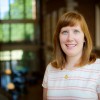This article is more than 5 years old.
I recently spent a long weekend, October 7-9, at a National Council on Public History conference in Great Smoky Mountains National Park. It was a conference focused on public history in the outdoors, in honor of the National Parks centennial, aimed at discussing “issues related to historic and contemporary public history as it took/takes place in outdoor leisure spaces.” Notably, this was a *camping* conference – we all slept in tents at a couple of group campsites in GSMNP – for those familiar with the park, in its Cades Cove area.
Many of my archives colleagues across America have spoken highly of NCPH annual conferences, so I was excited to be able to attend an NCPH event. This conference had a lot of pros for me: it was sort of local; gave me an opportunity to engage with historians, which as Collections Archivist I don’t always get to do; focused on outdoor spaces, which I’m into and which I think we could do more with given our collections related to the University and Baptist churches; involved campfire and s’mores; and as a bonus, was very reasonably priced. So I packed up my tent, sleeping bag, and a cooler (to be stored in a car because BEARS), and headed to Tennessee. I was able to carpool with a group of graduate students from NC State, one of whom was my tent mate for the weekend, and heard about their scholarship, interests, and music tastes (#Hamiltunes).
The conference was really excellent. It was small – about 45 people, I believe – so we were able to meet and hear from almost everyone there. We were all there together, so we were all equally damp, unshowered, and attired; it leveled the plain, I think, in ways that normal conferences cannot. Dinners were provided but we brought our own breakfasts and lunches and shared around. In the mornings and at breaks, we drank coffee and tea in reusable cups fresh from the camp stoves. Most sessions involved taking in the scenery in short walks.
As with most conferences, I didn’t attend a session that I didn’t like. On Friday, Brian Forist, a PhD student at Indiana University, gave a talk on “two-way interpretation” (basically, how parks share historical and natural information) that had me thinking about the way we present information in archives. Do we leave room for a variety of understandings, or do we put non-factual information in a way that makes it seem more factual, set in stone? Interpretation literature might be of interest to archivists exploring that aspect of our field.
I also loved discussing what archival information people were using and how they were finding those materials. One of the NC State graduate students, Derek Huss, had studied Appalachian Trail Conservancy newsletters looking at 1970s thru-hikers’ experience of the trail, and others’ perception of those hikers. If those newsletters were digitized using OCR, Derek or others would be able to perform an in-depth textual analysis of the newsletter’s presumed change in tenor over time.
For those of us engaged in improved diversity and inclusion at ZSR and Wake Forest, Saturday night’s keynote would be of interest. Led by Dr. Tamaria Warren, an environmental specialist for the US Army, we discussed Dr Carolyn Finney’s book Black Faces, White Spaces: Reimagining the Relationship of African Americans to the Great Outdoors and how that affects us all, as individuals and in our professional pursuits. Dr. Warren discussed her research into African-American perceptions of environmentalism in Detroit and Columbia, SC, as well, which was really interesting. When you hear the world “environmentalist,” what comes to mind? And what do those tell us about how to communicate better about environmental pursuits?
I could go on, but I’ll spare you. Book me for a coffee or lunch if you’d like to hear more, though! And information about this inaugural (but hopefully not last!) Camping Con are available on its Twitter feed and the conference website (there were no printed programs), as well.
